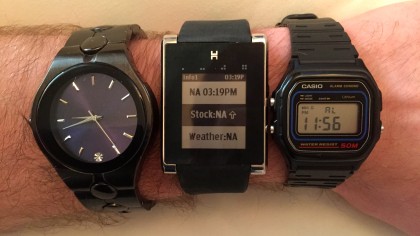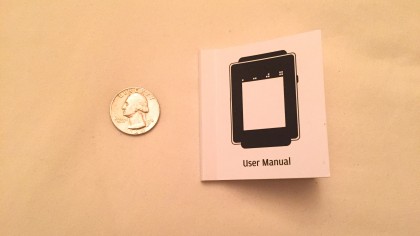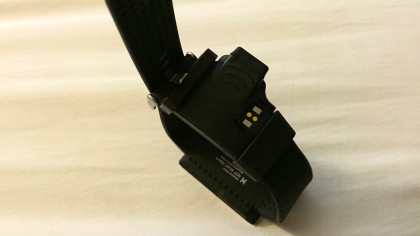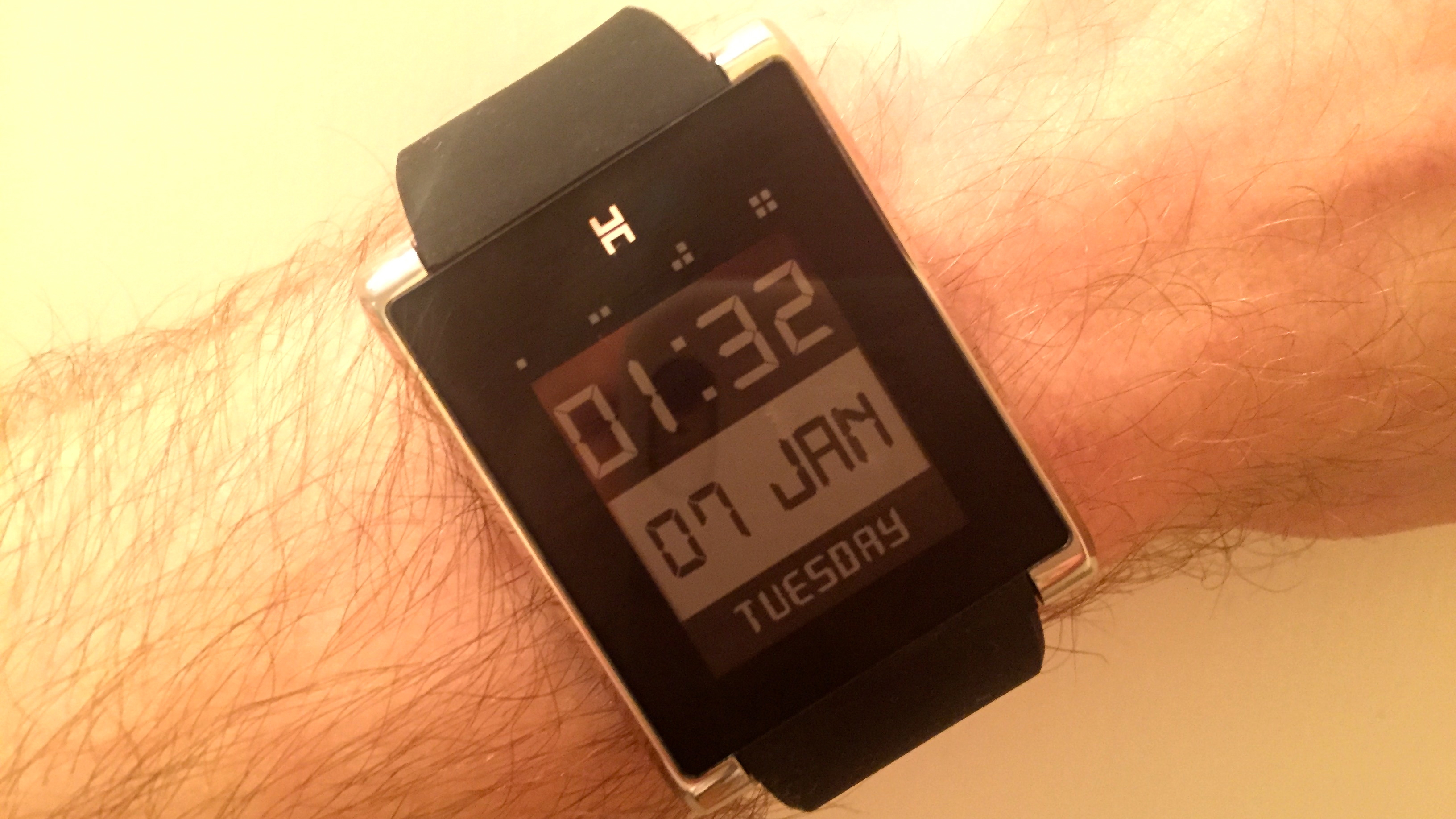Why you can trust TechRadar
The Hot Watch Edge's design is a marriage between sheer sleek and dumbfounded doofus. Its minimalistic, rectangular metal watch face is complemented by a black rubber wristband and steel buckle. The style speaks professional without obnoxiously screaming tech.
The Hot Watch has only one physical button used for powering the device on and off and enabling the LED light. It's outfitted with rubber and deeply embedded on the right hand side of the hardware component. Firm pressing is in order.
Wrapped on the wrist, the Hot Watch's band titillates the skin with a smooth rubbery velvet - it's comfortable. Adjusting for the "right fit" may take a few attempts, since the strap's end takes a little force when passing through the two resisting latex loops. Rubber on rubber lacks ease.
Don't pull the band too much; the moderately durable rubber material isn't elastic enough to be equipped via tug-of-war. You'll run the risk of white stretch marks bruising its ebony hue.
The actual metal hardware component of the Hot Watch Edge is thin, measuring only 8mm thick. It weighs less than a standard 6 oz. titanium dress watch but a little more than a 0.7 oz. plastic Casio. It's a nice size without an obvious presence when actively worn.

As for that dash of doofus? Below the band's buckle is the Hot Watch's little stubby protruding directional microphone/speaker. Adjacent to the noisy stub is the indented and exposed metallic face of the power input you connect the USB charger to.
Once worn, the fitted strap does a good job visually hiding the Hot Watch's blemishes. Unless you're bending your wrist forward, the microphone speaker won't poke you.
Sign up for breaking news, reviews, opinion, top tech deals, and more.
It wouldn't be tech if it weren't somewhat awkward.
Interface
To ensure the least amount of soul-crushing frustration and piping blood lust, you'll want to get as familiarized with the Hot Watch interface as possible. You begin by opening up a user manual made for ants:

Too small? Here's the incomplete online PDF version.
After downloading the dedicated Hot Watch app on the App Store (which has yet to receive a proper iOS 8 update), and syncing via Bluetooth, I assumed takeoff.
The Hot Watch divides its sser screens into two categories: "Time and Information" screens and "Advanced Function" screens. The former is divided into 5 x 5 sections that can be accessed through horizontal swipes. Navigation isn't too slow, but big fingers and small touch screens train you for gentler touches after constant misses.
The default screen displays an analog style watch face with the day, month and year. You can change the clock face style by swiping upwards, accessing a catalog ranging from avant garde to more classical looks.
Swiping right navigates you to digital clock faces that feel way more visually appropriate for the Hot Watch's nature. These too also had varying designs accessible through upward swipes.
Swiping right again will land you in "Information Screens." This is the Hot Watch's push navigation menu for weather updates, meetings, walking distance, SMS texts and social media notifications, stocks, etc. Sadly, my Hot Watch never managed to bring me any good news even after setting it up.
The last two menu screens hold Native Apps (games like tic-tac-toe and a Breakout clone) and something called "Custom Phone Apps;" mysterious blank menu screens presumably for custom app developments.
To add on another layer of complexity, the Hot Watch's navigation further expands in the last pages of its instruction manual, detailing a whole other set of menus titled "Advanced Screen Functions." (But wait, didn't the manual call them "Advanced Function Screens?") These are only accessible through corresponding letter traces on the Hot Watch's buggy touchscreen.
"Advanced Screen Functions" include:
- A phone menu that holds your recent calls, favorites, contacts and has a dial screen.
- A message menu for sending emails, Facebook messages, texts and tweets.
- An applications menu with a calculator, calendar, voice response, pedometer, music control and note taker.
- A clock menu with two alarms, time and date settings, calendar, stopwatch and timer.
- A Bluetooth Menu for beeping your misplaced phone and connecting to Bluetooth.
- A settings menu for adjusting vibration strengths, power level, font style, etc.
Hot Watch goes on to call these abominations "Hot Gestures", but more on that later.
Performance
The Hot Watch operates with an energy efficient Cortex M3 processor and a 6-axis accelerometer and gyroscope, two crucial computing systems that brought to life the Hot Watch's biggest selling point and promise: gesture controls.
The Hot Watch classifies its gestures into two groups: call gestures and non-call gestures. Call gestures are activated and usable while receiving an incoming call, or when you're in one. Non-call gestures are used for simple operations outside of phone calls, like turning on the backlight, invoking voice response, and pulling up your favorite contacts.

After switching your phone's primary speaker to the Hot Watch, you'll be ready to take phone calls at the flick of your wrist. You can always stick with your phone's audio speaker while using the Hot Watch, but doing so will make it harder for anyone to hear you if you're not speaking into your phone.
When you receive a call, the Hot Watch's microphone/speaker emits a low pitched ringtone with the interface switching over to the call screen. The ring is a calmer and less frenzied tone than blaring smartphones, and can be adjusted for volume via the touch screen.
Then comes the best part about the Hot Watch.
After a few hurried cusping hand gestures to my ear, it picked up. The Hot Watch's speaker doesn't have the clearest audio, but I didn't care - I just used my hand as a phone. The cherry on top is hanging up through a wave. In due time, my sporadic waving became more elegant.
I can't imagine how well the Hot Watch would do if it became a simple and cheaper alternative to phone calls without all the bloat, because from here on out, we're going downhill.
Non-call gestures are just as alluring and fun to pull off, even after countless tiring efforts that wind up making you look like Frankenstein's monster who can't handle his liquor.
To initiate them, you have to do two quick twists of the wrist. Imagine aggressively jingling an invisible door knob similar to when your parents suspected you of adolescent monkey business.
Assuming the Hot Watch interpreted you correctly, it'll start quickly listening for non-call gesture follow ups. The easiest one is switching on the backlight through a horizontal watch reading position - essentially, a third twist.
I managed to invoke the voice response once by accident. It's the same gesture for the backlight, but slower, and followed by, as the manual so beautifully puts it: "a slow tap of the hand top to bottom 2 times." Where now?
Bringing up contact favorites through gestures will remain a mystery to me. "Shake hand and move hand to ear when there is no incoming call" doesn't seem to work as well as the manual states. Sometimes its better to manually navigate to the actual screen.
Remember "Hot Gestures"? It's an unnecessary third term possibly formulated by the knee jerk reaction of the Hot Watch's marketing team that has nothing to do with cool hand movements.
Hot Gestures are a set of 11 defiled alphabet characters used as "touch shortcuts" you need to memorize in order to access the Hot Watch's "Advanced Screen Functions." Without them, there is no way to lock (or unlock) the sensitive touch screen, call people, change your settings, adjust the date and time, or access the Bluetooth menu.
The Hot Watch truly shines in defectiveness when it struggles to understand what you mean by tracing 'U' 700 times on its touch screen; a Hot Gesture that unlocks your smartwatch so you can actually use it. Memorizing Hot Gestures aren't so much an issue as they are a highlighting indicator of the Hot Watch's unresponsive touch screen.
For gentlemen of the fatter, rugged, and more oily finger such as myself, the touchscreen is your antithesis. Patience gets tested when the touch screen doesn't do what you want it to. The dial pad becomes a game of intense concentration, and one minor slip on the contact list and you're dialing an ex. To rub absolute salt in your wounds, it doesn't help that the date and time always reset when the watch shuts down, forcing you to manually fix it in the narrow and unforgiving Clock Menu settings.
Both the gesture controls and using your hand as a phone seem to be the only apparent reason the Hot Watch manages to survive today. It's certainly running its course as other smartwatches wake up and smelling the bacon.
Current page: Design, interface and performance
Prev Page Introduction and display Next Page Battery life, apps and fitness